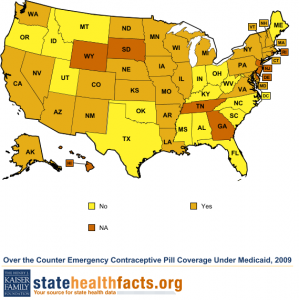BULLETIN: Our previous blog discussed this amendment. We're delighted to report that Senate has voted 51-48 against an amendment by Sen. Roy Blunt (R-Mo.) that would allow insurers to deny coverage of health services -- such as birth control -- if an employer objected on religious or moral grounds.
 Earlier this month, the Department of Health and Human Services reported that over 20 million American women in private health insurance plans have already gained access to at least one free preventive service because of the health care law. Without financial barriers like co-pays and deductibles, women are better able to access potentially life-saving services, and cancers are caught earlier, chronic diseases are managed and hospitalizations are prevented.
Earlier this month, the Department of Health and Human Services reported that over 20 million American women in private health insurance plans have already gained access to at least one free preventive service because of the health care law. Without financial barriers like co-pays and deductibles, women are better able to access potentially life-saving services, and cancers are caught earlier, chronic diseases are managed and hospitalizations are prevented.
A proposal (the Blunt Amendment) being considered in the Senate today would allow employers that have no religious affiliation to exclude coverage of any health service, no matter how important, in the health plan they offer to their workers. This proposal isn't limited to contraception nor is it limited to any preventive service. Any employer could restrict access to any service they say they object to on moral grounds. This is dangerous and wrong. To read more about both sides of this debate click HERE.
If you feel strongly on this issue, call you Senator NOW!
 Last week, President Obama announced that he would continue to protect women's access to birth control without co-pays or deductibles regardless of where they work, including at certain religiously-affiliated employers, while accommodating religious institutions' opposition to contraception. Under a compromise announced Feb. 10, religious institutions that object to providing such coverage will not have to offer it. However, the institution's insurer will have to reach out directly to the employees and offer the coverage free of charge. The end result is that no religious organization will have to pay for or provide contraceptive services, but women who work at these institution will have access to contraceptive services directly from their contracted insurance company. This looks like a reasonable solution to try for now, but......
Last week, President Obama announced that he would continue to protect women's access to birth control without co-pays or deductibles regardless of where they work, including at certain religiously-affiliated employers, while accommodating religious institutions' opposition to contraception. Under a compromise announced Feb. 10, religious institutions that object to providing such coverage will not have to offer it. However, the institution's insurer will have to reach out directly to the employees and offer the coverage free of charge. The end result is that no religious organization will have to pay for or provide contraceptive services, but women who work at these institution will have access to contraceptive services directly from their contracted insurance company. This looks like a reasonable solution to try for now, but......
Despite this accommodation, opponents of birth control in Congress have introduced the Blunt Amendment which would, among other things, allow any corporation whose CEO opposes contraception based on his "moral convictions" to deny all coverage of contraception or any other health care service to the company's employees. The big question: Will this amendment, if passed, eventually lead to allowing CEOs of ANY corporation (not just a religiously affiliated one), cancel contraception from his/her company plan because of moral convictions????
Call 1-888-838-5169 TODAY to tell your Senators what YOU think about the Blunt Amendment and its impact on access to no-cost birth control and other critical health care services. Also, check out our previous blog on this topic
For readers who want to examine the text of Blunt's proposed amendment, here are two key sections:
"Nothing in this title (or any amendment made by this title) shall be construed to require an individual or institutional health care provider, or authorize a health plan to require a provider, to provide, participate in, or refer for a specific item or service contrary to the provider's religious beliefs or moral convictions. Notwithstanding any other provision of this title, a health plan shall not be considered to have failed to provide timely or other access to items or services under this title (or any amendment made by this title) or to fulfill any other requirement under this title because it has respected the rights of conscience of such a provider."
Another part of the amendment makes clear that "no exchange or other official or entity acting in a governmental capacity in the course of implementing this title ... shall discriminate against a health plan, plan sponsor, health care provider, or other person because of such plan's, sponsor's, provider's, or person's unwillingness to provide coverage of, participate in, or refer for, specific items or services."
 As this blog predicted, both politics and religion have entered the women's health arena and it may result in a reduction in hard-fought-for services and advances for women. Recently, the US Dept. of Health and Human Services modified the final ruling that requires new health insurance plans to cover contraceptive services without a copay or deductible by August 2012. A temporary compromise, giving non-profit employers who, based on religious beliefs, do not want to include contraception access within their plans, an additional year to adapt to the new ruling. While churches are exempt, hospitals and other large social services that may have religious affiliations will be expected to offer contraception in their plans by 2013 and they are not happy about it. Religious leaders are rallying against the new ruling and women who need contraception are feeling outraged.
As this blog predicted, both politics and religion have entered the women's health arena and it may result in a reduction in hard-fought-for services and advances for women. Recently, the US Dept. of Health and Human Services modified the final ruling that requires new health insurance plans to cover contraceptive services without a copay or deductible by August 2012. A temporary compromise, giving non-profit employers who, based on religious beliefs, do not want to include contraception access within their plans, an additional year to adapt to the new ruling. While churches are exempt, hospitals and other large social services that may have religious affiliations will be expected to offer contraception in their plans by 2013 and they are not happy about it. Religious leaders are rallying against the new ruling and women who need contraception are feeling outraged.
Since many of our readers are outside the U.S. and have universal access to contraception, let me explain. Many women in the United States use contraception, especially the 'pill', even though it is rarely covered by insurance requiring women to paying for it 'out of pocket'. The average cost per year is $600 which is a financial challenge for many younger women. In order to meet the needs of women with limited incomes, social service programs have been providing contraception through local public health departments and agencies like Planned Parenthood but their resources are limited. When viagra was released for men--and covered by most public and private insurance plans- it refueled the argument for insurance coverage for contraceptives. It should be noted that contraceptives not only prevent pregnancy, they are often used to regulate difficult menses, reduce the risk of ovarian cancer, treat fibroids, and reduce anemia due to heavy menstrual bleeding.
The role of churches, synagogues, and mosques is to provide a place to provide spiritual guidance to their members based on the teachings of their faith. According to the US Constitution, these institutions have the freedom to preach and practice their faith. Their members generally adopt those beliefs and practice them in their daily lives. These institutions are not free to impose their beliefs on others who do not espouse their teachings.
Hospitals and social service agencies are not houses of worship. Decades ago, most hospitals were run by religious orders. Today, hospitals (whether public, private or non-profit) are very large businesses that provides a valuable service and are paid for most of these services. They take in patients no matter what their religion. Hospitals also have to be competitive to attract the best employees by offering a comprehensive benefit package which includes a list of services that they may or may never use. Hospitals are subject to legal business practices because they are corporations (registered with the local state) and dependent on third party payers (insurance or public aid) to support their services. Because they accept third party payment in the form of insurance, they need to follow certain federal and state regulations. The days of the kinder and gentler Catholic hospital run by nuns is gone. Now, religious hospitals are merging into big, competitive conglomerates. As such, they are a business that just so happens to have a religious affiliation. They do not preach theology in waiting rooms. Staff members do not need to be a member of a certain house of worship to work there.
So here is a solution. Hospital and care agencies include contraception (as per law) in their compensation package to employees as well as other attractive options like smoking cessation to attract the best professionals possible. Female non-smokers who need contraception use the contraceptive benefit, but they do not use the smoking cessation benefit. A Catholic employee who smokes, who does not believe in contraception, chooses to use the smoking cessation benefit but not the pill. If a mega hospital run by a religiously run corporation wants the best employees, they better focus on good business practices and leave the spiritual guidance to their affiliated houses of worship. It's all about choice, a woman who firmly believes contraception is wrong, can simply say no.
P.S. Word on the street is that government leaders are split on this issue with women more in favor of better access to contraception. The National Women's Law Center is requesting help with a petition that you can sign on by clicking HERE.
 Pfizer Inc. announced today that it has voluntarily recalled 14 lots of Lo/Ovral®-28 (norgestrel and ethinyl estradiol)Tablets and 14 lots of Norgestrel and Ethinyl Estradiol Tablets (generic) for customers in the U.S. market. An investigation by Pfizer found that some blister packs may contain an inexact count of inert or active ingredient tablets and that the tablets may be out of sequence. The cause was identified and corrected immediately.
Pfizer Inc. announced today that it has voluntarily recalled 14 lots of Lo/Ovral®-28 (norgestrel and ethinyl estradiol)Tablets and 14 lots of Norgestrel and Ethinyl Estradiol Tablets (generic) for customers in the U.S. market. An investigation by Pfizer found that some blister packs may contain an inexact count of inert or active ingredient tablets and that the tablets may be out of sequence. The cause was identified and corrected immediately.
As a result of this packaging error, the daily regimen for these oral contraceptives may be incorrect and could leave women without adequate contraception, and at risk for unintended pregnancy. These packaging defects do not pose any immediate health risks. However, consumers exposed to affected packaging should begin using a non-hormonal form of contraception immediately. Patients who have the affected product (lot numbers available by clicking here) should notify their physician and return the product to the pharmacy.
These products are packaged in blister packs containing 21 tablets of active ingredients and seven tablets of inert ingredients. Correct dosing of this product is important in avoiding the associated risks of an unplanned pregnancy. Any adverse events that may be related to the use of these products should be reported to Akrimax Medical Information at 1-877-509-3935 (8 AM to 7 PM Mon-Fri CST) or to FDA's Med Watch Program either online, by regular mail or by fax.
 November 17, 2011
November 17, 2011
Last August, the Department of Health and Human Services (HHS) issued a proposed rule containing the Institute of Medicine’s recommendation that health plans cover the full range of FDA-approved contraceptive methods, sterilization procedures, and patient education and counseling for all women, without cost-sharing. The proposed rule contained an exemption from the contraception requirement for non-profit religious organizations providing group coverage and which mainly employ individuals sharing the religious views of the organization.
We are now facing the possibility that, within the next few days, the Obama administration will expand the current religious exemption from the contraceptive coverage requirement to allow religiously affiliated hospitals, charities, and universities to exclude contraceptive coverage from their employee health plans.
Religious groups are exerting intense pressure on the administration, claiming that the contraception coverage requirement infringes on their “religious liberty” and seeking to have their beliefs and tenets bind all Americans’ health insurance coverage. These groups do not support access to contraception and will not do so no matter the exemption made.
If you want to weigh in on this debate, contact the White House today at http://www.whitehouse.gov/contact or 202-456-1111 and urge the President to protect women’s health and NOT to expand the religious exemption. The exemption makes no medical sense. Every woman deserves affordable health care, including contraception, no matter where she works.
 Improving maternal health has been a primary goal of the international community led by three United Nations Agencies (UN Populations Fund (UNFPA), the World Bank and the World Health Organization) since they launched the Safe Motherhood Initiative in 1987. Over the years their goals have been reviewed and updated, and in 2007, in recognition to the close links between maternal health and other reproductive conditions, a second target--ensuring universal access to reproductive health services was added to the Millennium Development Goals (MDG).
Improving maternal health has been a primary goal of the international community led by three United Nations Agencies (UN Populations Fund (UNFPA), the World Bank and the World Health Organization) since they launched the Safe Motherhood Initiative in 1987. Over the years their goals have been reviewed and updated, and in 2007, in recognition to the close links between maternal health and other reproductive conditions, a second target--ensuring universal access to reproductive health services was added to the Millennium Development Goals (MDG).
According to UNFPA, about 200 million women and girls globally who want to use contraceptives do not have access to them. In a survey conducted in Uganda, 41% of the women who responded wished to space their pregnancies further apart--a key health factor for both mothers and children--but lacked access to contraception and family planning services. The Ugandan government has failed to respond with resources to address this need despite the fact that their country has one of the highest maternal mortality rates in the world. In other countries like Zambia and Ethiopia, empty dispensaries are all too common.
Lack of access to birth control leads to abortions and according to the World Health Organization, an estimate 20 million unsafe abortions take place each year. Worldwide, at least 68,000 women annually die from such procedures, and another estimated 5 million women per year suffer long-term injury.(Grimes DA et al. Lancet Reprod Health Ser. 2006).
Considering what we spend on defense and bailing out unscrupulous banks, the cost of contraception is pennies, yet the lives it could save are immense.
New information from the Kaiser Family Foundation and the George Washington University School of Public Health and Health Services on family planning services covered under Medicaid has been added and is available for 2009 for all states. The number of states that cover over-the-counter emergency contraception is 26; sterilization (36 +DC); Infertility testing (4); Infertility treatment (0); STD Testing (11) and Treatment (9); HPV Vaccine for ages 21-26 (29). The report also contains information about family planning eligibility service waivers for each state. The map below demonstrates the emergency contraception coverage.

To view the entire report visit
